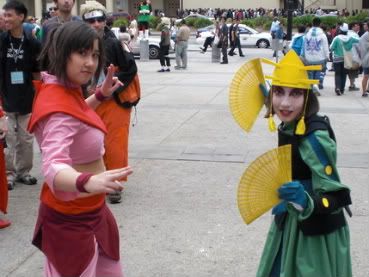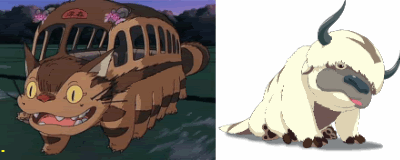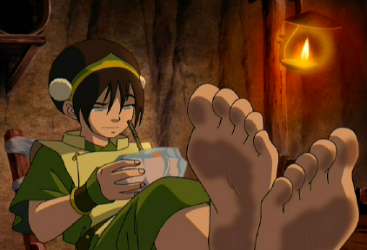“Avatar” and its Place in Otaku Culture
I was getting dinner at my local Subway restaurant the other day when I was overhearing the people in front of me. It was a mother and her 8-year-old son. The boy was acting like little boys do, a little hyperactive, loud, and very annoying to the people around him. So the mother came up with the best way to calm him down:
“You better behave,” she warned him, “or you’re not going to be able to watch Avatar tonight. You want to watch Avatar, don’t you?”
“Uh huh,” the boy said, and he did quiet down and behave himself after that. I was a little tempted to tell the boy, “I also want to watch Avatar tonight,” but I’ve learned from my days of selling DBZ toys at Toys R Us that this kind of cross-generational fanboy talk never goes so well with the mother…
But I was actually taken aback a little bit when I overheard this conversation. I have been a huge fan of the series for a couple of years, and I’ve seen it become so widely accepted among my peers. I’ve talked about it with my anime club back in college. I’ve seen it cosplayed many times at anime convention. I’ve been to convention panels where fanboys would go nuts over the action sequences and fangirls would coo over various coupling… including some yaoi pairings!

In my mind, Avatar has become just as much as part of the American otaku culture as any other mainstream anime show from Japan. So now that the show has finally ended its run on TV, I’m left to wonder just how does this series manage to become such a huge part of the otaku community yet still appeal to your average American boy?
The most obvious reason for the otaku appeal of the series is the strong anime influence of the show, particularly that of famous director Hayao Miyazaki. One of Miyazaki’s main themes through out his films is his main character’s ability to fly with the help of magic or machine. Avatar‘s lead character, Aang, is able to manipulate the wind to be able fly anywhere with the help of a glider he carries around. Also, one of the main characters, a big furry flying bison named Appa, is modeled after the big furry flying Catbus character from Miyazaki’s My Neighbor Totoro.

But even beyond the Miyazaki influence, I recall seeing character designs through out the first two season that appeared to be taken from from Cowboy Bebop, Akira, and the works of veteran anime director Leiji Matsumoto. The martial arts and supernatural fighting abilities through out the show are very common in action oriented anime shows like Dragonball Z. And the third season even included a “let’s go to the beach” episode, a cliche plot device in anime.
There’s even other non-anime Asian influences that I’m sure also reflects well with the otaku audience for their exotic nature. The show is filled with Asian names, religion, costumes, philosophy, and architecture. Chinese is also the only written language in the Avatar universe, and the Chinese characters of the four elements are show in the open few seconds of every show.
But even though it is very much like Japanese anime, Avatar is still American. It was created and written by Americans and made for an American audience. Because of this, it even has some advantages over its foreign counterpart, mostly in terms of humor. The Japanese and American have two very different senses of humor. A lot of American humor is based on sarcasm and cynicism, which is just not a part of the Japanese culture. So as funny as most Japanese anime show are, they simply cannot reach out to an American in the same way that our domestic cartoons, such as South Park or The Simpsons, can.

The character of Toph is the best example of this American advantage. Her main gimmick, a blind warrior who must rely on her other senses to fight, is typical in the world of anime and Asian cinema. However, her personality as a frank and very cynical smart ass is completely American. She drops many one liners to the other characters, and her jokes become just as much as part as her character as her fighting ability. The humor to her character, along with that of the show in general, just connects with the audience, and I found myself having the most genuine “laugh out loud” moments watching Avatar than any other anime show out there.
Along with the wit of the humor, there’s also just a lot of mature concepts and ideals for the older fan to think about. In one episode, Zuko’s wise old uncle, Iroh, is being offered to have his fortune read by a city’s famous fortunteller.The uncle declines the offer and quips back, “At my age there is really only one big surprise left, and I’d just as soon leave it a mystery.” A line like that took me a while to get, but I just found it very profound when I did. Surely something like this would just go over the heads of any child watching this show.
In fact, I never feel like I’m watching a children’s show when I’m watching Avatar. There’s never a moment of immaturity, high moral values, safe imagery, or just the squeaky clean polish you always associate with a kids show. The only thing that reminds me about the show’s intended audience is the Nickelodeon logo in the corner of each episode.
But the little boy in Subway was a clear indication that the show was also appealing to the target demographic of the network, and while I can’t explain the mentality of a 8-year-old, I know that him being a fan of the series is a very good sign of the future. He’s growing up watching a show filled with all the same things that we, the otaku community, love about our favorite medium. It wouldn’t be too surprising if the boy ends up becoming an otaku when he gets into teens or early adulthood.
And by the time that happens, the idea of anime only coming from Japan might also just be a thing of the past.
I think that in its three seasons, Avatar established itself as a revolutionary show. It was an American-produced animated series that successfully captured all the unique quialties of Japanese anime while still maintaining the same humor that our own domestic cartoons do best. This has earned the show a special place in our otaku community, and will probably create a brand new generation of anime fans in the years to come.